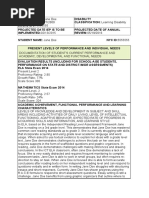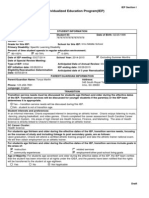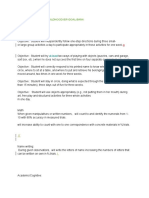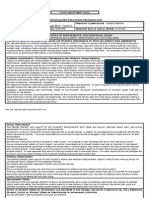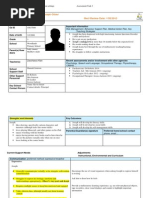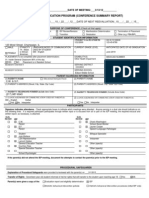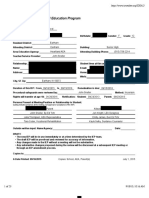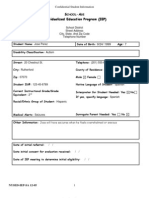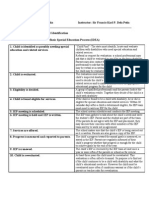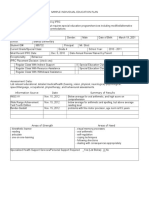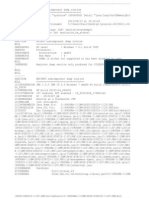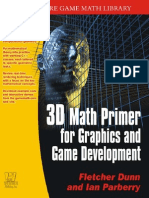50%(6)50% found this document useful (6 votes)
6K viewsIep Blank Template 1
Iep Blank Template 1
Uploaded by
daredevl126This document outlines an Individual Education Plan (IEP) for a male student aged 10 with Asperger's Disorder. The IEP details the student's strengths in mathematics, independent work, and logic/reasoning, as well as needs in teamwork, attention, and emotional skills. Modifications are made for the student's French class, exempting some content and allowing accommodations like reduced formatting, breaks, and a computer for testing. Goals for the IEP include recognizing simple French words and producing short simple sentences in French with support. Teaching strategies include matching words and choosing topics of interest, while assessments include multiple choice, map tasks, and translating sentences.
Copyright:
© All Rights Reserved
Available Formats
Download as DOCX, PDF, TXT or read online from Scribd
Iep Blank Template 1
Iep Blank Template 1
Uploaded by
daredevl12650%(6)50% found this document useful (6 votes)
6K views3 pagesThis document outlines an Individual Education Plan (IEP) for a male student aged 10 with Asperger's Disorder. The IEP details the student's strengths in mathematics, independent work, and logic/reasoning, as well as needs in teamwork, attention, and emotional skills. Modifications are made for the student's French class, exempting some content and allowing accommodations like reduced formatting, breaks, and a computer for testing. Goals for the IEP include recognizing simple French words and producing short simple sentences in French with support. Teaching strategies include matching words and choosing topics of interest, while assessments include multiple choice, map tasks, and translating sentences.
Original Description:
Template of IEP
Copyright
© © All Rights Reserved
Available Formats
DOCX, PDF, TXT or read online from Scribd
Share this document
Did you find this document useful?
Is this content inappropriate?
This document outlines an Individual Education Plan (IEP) for a male student aged 10 with Asperger's Disorder. The IEP details the student's strengths in mathematics, independent work, and logic/reasoning, as well as needs in teamwork, attention, and emotional skills. Modifications are made for the student's French class, exempting some content and allowing accommodations like reduced formatting, breaks, and a computer for testing. Goals for the IEP include recognizing simple French words and producing short simple sentences in French with support. Teaching strategies include matching words and choosing topics of interest, while assessments include multiple choice, map tasks, and translating sentences.
Copyright:
© All Rights Reserved
Available Formats
Download as DOCX, PDF, TXT or read online from Scribd
Download as docx, pdf, or txt
50%(6)50% found this document useful (6 votes)
6K views3 pagesIep Blank Template 1
Iep Blank Template 1
Uploaded by
daredevl126This document outlines an Individual Education Plan (IEP) for a male student aged 10 with Asperger's Disorder. The IEP details the student's strengths in mathematics, independent work, and logic/reasoning, as well as needs in teamwork, attention, and emotional skills. Modifications are made for the student's French class, exempting some content and allowing accommodations like reduced formatting, breaks, and a computer for testing. Goals for the IEP include recognizing simple French words and producing short simple sentences in French with support. Teaching strategies include matching words and choosing topics of interest, while assessments include multiple choice, map tasks, and translating sentences.
Copyright:
© All Rights Reserved
Available Formats
Download as DOCX, PDF, TXT or read online from Scribd
Download as docx, pdf, or txt
You are on page 1of 3
Individual
Education Plan IEP
REASON FOR DEVELOPING THE IEP
Student identified as
exceptional by IPRC
Student not formally identified but requires special education
program/services, including modified/alternative learning expectations and/or
accommodations
STUDENT PROFILE
Name: Gender: Male Date of Birth: Age 10
School:
Student OEN/MIN: Principal:
Current Grade/Special Class: Grade 5 School Year:
Most Recent IPRC Date: Date Annual Review Waived by Parent/Guardian:
Exceptionality: Aspergers Disorder
IPRC Placement Decision (check one)
Regular class with indirect support Special education class with partial integration
Regular class with resource assistance Special education class full-time
Regular class with withdrawal assistance
ASSESSMENT DATA
List relevant educational, medical/health (hearing, vision, physical, neurological), psychological,
speech/language, occupational, physiotherapy, and behavioural assessments.
Information Source Date Summary of Results
Audiometry Test Negative for hearing impairment
Behaviour Rating Inventory of
Executive Function (BRIEF)
Possible Autism, further tests required
Aspergers Syndrome Diagnostic
Scale (ASDS)
Positive for Aspergers disorder.
STUDENTS STRENGTH AND NEEDS
Areas of Strength Areas of Need
Mathematics Teamwork skills
Independent work Auditory memory skills
Precise instructions Anger management skills
Reading Attention skills in areas of disinterest
Logic and Reasoning Emotional recognition
Health Support Service/Personal Support Required Yes (list below) No
SUBJECTS, COURSES, OR ALTERNATIVE PROGRAMS TO WHICH THE IEP APPLIES
Identify each as Modified (MOD), Accommodated only (AC), or Alternative (ALT)
1. French
MOD AC ALT
6.
MOD AC ALT
2.
MOD AC ALT
7.
MOD AC ALT
3.
MOD AC ALT
8.
MOD AC ALT
4.
MOD AC ALT
9.
MOD AC ALT
5.
MOD AC ALT
10.
MOD AC ALT
Elementary Program Exemptions or Secondary School Compulsory Course Substitutions
Yes (provide educational rationale) No
GLE Course(s) will replace the French diploma requirement to support the students exceptionality
Complete for secondary students only:
Student is currently working towards attainment of the:
Ontario Secondary School Diploma Ontario Secondary School Certificate Certificate of Accomplishment
ACCOMMODATIONS
These accommodations are for the French class but may be applied to all other subjects if deemed
appropriate at a later date.
Instructional Accommodations Environmental Accommodations Assessment Accommodations
Reinforcement incentives
High structure to keep his mind
occupied as to avoid
distractions
Frequent breaks to refresh
himself. This will bring back his
attention to the task at hand
Interactive language software
during the French teachings
Option for computerized
learning
Use of headphones to focus his
concentration on his work and
not his peers
Alternative work space
Minimize background noises
and distractions
Assistive equipment will help in
the understanding and
concentration of course
material
Study carrel
Alternative settings during
testing
Prompts for returning
attention back to the school
work
Reduced format and clutter on
each page
Computer testing option
Extra time if required for
concentration.
Individualized Equipment Yes (list below) No
Computer Microphone
Headphones French language teaching program
French incorporated computer game Interactive French computer software
PROVINCIAL ASSESSMENTS (accommodations and exemptions)
Provincial assessments applicable o the student in the current school year: Not Applicable
Accommodations: Yes (list below) No
Exemptions: Yes (provide explanatory statement from relevant EQAO document) No
Special Education Program
To be completed for each subject/course with modified expectations and/or each alternative program with alternative expectations
Student OEN/MIN:
Subject/Course/Alternative Program:
Current Level of Achievement: Current Level of Achievement for Alternative Program:
.
Prerequisite course (if applicable)
Letter grade/Mark C
Curriculum grade level
Grade 5
Annual Program Goal(s): The student will be able to complete the required curriculum for grade
5 French with the exception of section A from The Ontario Curriculum, French as a
second language; core French: Grade 5. pg 67-79.
Learning Expectations
(List modified/alternative expectations outlining
knowledge and/or skills to be assessed, by reporting
period. Identify grade level, where appropriate.)
Teaching Strategies
(List only those that are particular to the student
and specific to the learning expectations)
Assessment Methods
(Identify the assessment method to be used for
each learning expectation)
Able to recognize simple
French words (pg. 74)
Will not translate oral French
into written English (pg. 72)
Only required to know two
French speaking areas in
Canada (pg. 69)
Will only be required to
produce French
communication on one topic
(pg. 72)
The student will not speak to
the class in French. He will
speak to the teacher or
assistant in French. Only in
short simple sentences.(pg. 71)
Match simple French words
to their English counterpart
on the board and in
workbooks
Do not give instructions to
student in French.
Colour map of where these
areas are located in Canada
with associated names
Get him to choose a topic
that he is interested in and
give him as many words as
you can. Tell him to try to
learn as many as he can.
Try to work with him one on
one when possible. When it is
not possible allow him to
work on the computer by
himself
Multiple choice/ matching
questions
Do not asses his ability to
translate oral French
Get him to point out the
names of these areas on a
map of Canada and name
them.
He must make two brief
sentences including two of
the learned words per
sentence
Translate a simple sentence
from French to English and
say it out loud.
You might also like
- Jane Doe Sample IEPDocument18 pagesJane Doe Sample IEPCats71% (21)
- Iep-Form-Template Fillable-Done 1Document6 pagesIep-Form-Template Fillable-Done 1api-31263385667% (3)
- Sample IepDocument5 pagesSample Iepapi-21525969188% (8)
- Form LD 2 Checklist AssessmentDocument12 pagesForm LD 2 Checklist AssessmentMyrene Grace C. Billones100% (8)
- Individualized Education Plan: Custodial DetailsDocument4 pagesIndividualized Education Plan: Custodial DetailsIsaiah Peligrino77% (13)
- Sample IEP For Child With AutismDocument11 pagesSample IEP For Child With AutismAlexandra Andreea83% (6)
- Nevada Iep FormDocument11 pagesNevada Iep Formapi-302071047100% (1)
- Detailed Lesson Plan For Tying ShoesDocument2 pagesDetailed Lesson Plan For Tying ShoesknhubNo ratings yet
- IEP TemplateDocument14 pagesIEP TemplateMary Collantes100% (5)
- IEP Format SampleDocument10 pagesIEP Format SampleChristine Joy Pama75% (4)
- Mod 4 CB IepDocument3 pagesMod 4 CB Iepapi-455438287100% (3)
- Iep in The PhilippinesDocument16 pagesIep in The PhilippinesKATRINA DOMINIQUE PINPIN100% (3)
- Competency Based Iep ExampleDocument4 pagesCompetency Based Iep Exampleapi-468572823100% (1)
- Final Iep Educ 521Document15 pagesFinal Iep Educ 521api-36806204167% (6)
- Examples of IEP Goals and Objectives - For - ASDDocument5 pagesExamples of IEP Goals and Objectives - For - ASDoradu1395100% (1)
- Iep Form 09 StaticDocument15 pagesIep Form 09 StaticAllehsiad Zenitram100% (1)
- Parent InterviewDocument3 pagesParent Interviewapi-305278212No ratings yet
- GoalBankIEPVersion9NY PDFDocument173 pagesGoalBankIEPVersion9NY PDFlirebien94% (16)
- Iep in The PhilippinesDocument16 pagesIep in The Philippinesjade tagab100% (1)
- Iep Cheat SheetDocument11 pagesIep Cheat Sheetapi-343665078100% (3)
- Iep ExampleDocument3 pagesIep Exampleapi-272643348100% (1)
- Iep Example TransitionDocument13 pagesIep Example Transitionapi-302270549No ratings yet
- Catalogo 2023 ENGDocument52 pagesCatalogo 2023 ENGabdellahguedira6No ratings yet
- Sample IepDocument10 pagesSample Iepapi-277472970100% (3)
- Iep For JeremyDocument8 pagesIep For Jeremyapi-241283264100% (1)
- Iep TemplateDocument13 pagesIep Templateapi-301094873100% (1)
- School Companion Sample ReportDocument15 pagesSchool Companion Sample ReportXlian Myzter Yosa100% (1)
- Teaching in a Special Education Classroom: A Step-by-Step Guide for EducatorsFrom EverandTeaching in a Special Education Classroom: A Step-by-Step Guide for EducatorsRating: 5 out of 5 stars5/5 (2)
- Learning Disabilities-Checklist (Example)Document2 pagesLearning Disabilities-Checklist (Example)kanimaki83% (6)
- IEPDocument17 pagesIEPheilmant14100% (1)
- IepformDocument9 pagesIepformapi-273441949No ratings yet
- Sample Social IEP GoalsDocument3 pagesSample Social IEP Goalsteamirene13100% (1)
- Case Study IepDocument6 pagesCase Study Iepapi-168258709No ratings yet
- Learning Disability ChecklistDocument2 pagesLearning Disability ChecklistGheylhu Amor100% (3)
- Iep Goal Bank 2Document65 pagesIep Goal Bank 2Maris TacordaNo ratings yet
- Sample Individualized Education ProgramDocument10 pagesSample Individualized Education Programapi-258376428No ratings yet
- Special Needs ChecklistDocument42 pagesSpecial Needs ChecklistPratibha GusainNo ratings yet
- Individualized Education Plan (Iep)Document8 pagesIndividualized Education Plan (Iep)Sarah Lombres Antigua Montefalco100% (1)
- Sped MelcDocument7 pagesSped MelcRaniel R Billones75% (4)
- Phil ECD Child RecordForm2 - FinalDocument34 pagesPhil ECD Child RecordForm2 - FinalJovito Limot100% (16)
- 01 MakabayanDocument5 pages01 MakabayanChristopher Dela Cruz Espero50% (2)
- IepDocument8 pagesIepapi-297768775100% (2)
- Sample IEPDocument6 pagesSample IEPAshar AkbarNo ratings yet
- IEPDocument30 pagesIEPCourtney RaiaNo ratings yet
- Sample IEPDocument7 pagesSample IEPMara Rueda100% (2)
- Allison IEPDocument23 pagesAllison IEP000766401No ratings yet
- IEP Template - ContextualizedDocument8 pagesIEP Template - ContextualizedVon Joseph Dela RapaNo ratings yet
- Individualized Education Program (Iep) S N D B: L ID #: D C P IEP P Present Levels of Performance and Individual Needs E R (-, S - )Document10 pagesIndividualized Education Program (Iep) S N D B: L ID #: D C P IEP P Present Levels of Performance and Individual Needs E R (-, S - )api-271874263No ratings yet
- IEPDocument14 pagesIEPAndrea BarrosoNo ratings yet
- IepDocument10 pagesIepapi-272760222100% (2)
- Sample IEP 2014Document2 pagesSample IEP 2014Carol Rombaoa Serdenia100% (1)
- Special Education ChecklistDocument5 pagesSpecial Education Checklistapi-456965532No ratings yet
- Assessment and Referral Special Education by T.RicciDocument5 pagesAssessment and Referral Special Education by T.RicciGeegee Semana100% (3)
- Individualized Education Plan Annex 6Document5 pagesIndividualized Education Plan Annex 6Fritzie Ann BinegaNo ratings yet
- IEP GoalsDocument36 pagesIEP GoalsSree Laxmi AdibhatlaNo ratings yet
- Iep ManualDocument38 pagesIep Manualapi-30264868850% (2)
- Iep Case StudyDocument14 pagesIep Case Studyapi-316488222100% (5)
- Teaching Strategies in Handling Students With Intellectual DisabilityDocument19 pagesTeaching Strategies in Handling Students With Intellectual DisabilityNedgee HernandezNo ratings yet
- Sample IepDocument5 pagesSample IepMj Ong Pierson Garbo100% (1)
- Sample-Individual-Education-Plan-for-Children-with-Intellectual DisabilityDocument5 pagesSample-Individual-Education-Plan-for-Children-with-Intellectual DisabilityJESSAMINE LAMELA100% (9)
- Assessment Tools and Development of IEPDocument37 pagesAssessment Tools and Development of IEPAurobind GaneshNo ratings yet
- The Big Book of Special Education Resources: Second EditionFrom EverandThe Big Book of Special Education Resources: Second EditionNo ratings yet
- Electrician & Plumbing Services: Business Proposal Prepared BY: Shahrukh Khalid Abdullah Kamran JazibDocument23 pagesElectrician & Plumbing Services: Business Proposal Prepared BY: Shahrukh Khalid Abdullah Kamran JazibShahRukh KhalidNo ratings yet
- AE 233 Strategic Business AnalysisDocument4 pagesAE 233 Strategic Business AnalysisHafie DiranggarunNo ratings yet
- Professional Capital BOOK NOTESDocument33 pagesProfessional Capital BOOK NOTESVenunadhan B. PillaiNo ratings yet
- About CashlessFX & FOREX TRUTHDocument4 pagesAbout CashlessFX & FOREX TRUTHCitizen AmissahNo ratings yet
- Invesco India Caterpillar PortfolioDocument1 pageInvesco India Caterpillar PortfolioAnkurNo ratings yet
- Eaton Cooper Fire Addressable Beam Detectors Mab50r Mab100r Datasheet enDocument2 pagesEaton Cooper Fire Addressable Beam Detectors Mab50r Mab100r Datasheet enCost RootsNo ratings yet
- Lovecraft, Il Labirirnto e Il MinotauroDocument429 pagesLovecraft, Il Labirirnto e Il Minotaurolupobianco555No ratings yet
- CV Ajay MittalDocument4 pagesCV Ajay MittalshubNo ratings yet
- Depth-First Search: 11.1 Topological SortDocument20 pagesDepth-First Search: 11.1 Topological SortSomesh MehtaNo ratings yet
- Ing, Prentice-Hall, Inc., Englewood Cliffs, New Jersey, 1984Document39 pagesIng, Prentice-Hall, Inc., Englewood Cliffs, New Jersey, 1984Sagor KhanNo ratings yet
- BackIntelligence Herniated Disc ExercisesDocument9 pagesBackIntelligence Herniated Disc Exercisesswaminathan1No ratings yet
- Arguemt EssayDocument4 pagesArguemt Essayapi-296516085No ratings yet
- Lypds SSM 2022 1 FaDocument2 pagesLypds SSM 2022 1 FaPratiwi NotonegoroNo ratings yet
- FCPM024 Lessons Learned DocumentDocument4 pagesFCPM024 Lessons Learned Documentmerlyn syderNo ratings yet
- Discrete Mathematical Structures - G S RAODocument11 pagesDiscrete Mathematical Structures - G S RAOvg_mrt0% (1)
- 40 - SIP - Darshil GudhkaDocument24 pages40 - SIP - Darshil GudhkaDarshil GudhkaNo ratings yet
- Amish Paradise or Paradise Lost? (Effects of Tourism Upon Amish Communities)Document78 pagesAmish Paradise or Paradise Lost? (Effects of Tourism Upon Amish Communities)Phan Thảo NguyênNo ratings yet
- Gasoline and Diesel Price ForecastDocument5 pagesGasoline and Diesel Price ForecastabdulazizNo ratings yet
- ENTREP WK1 - RemovedDocument4 pagesENTREP WK1 - RemovedMaricel BeranaNo ratings yet
- SHOCK ABSORBER TestDocument8 pagesSHOCK ABSORBER TestService MMINo ratings yet
- Prepared For: Madam Susana NarawiDocument21 pagesPrepared For: Madam Susana NarawiNUR KHAIRUNNISA MOHAMAD ISMAILNo ratings yet
- Making Your Own Discone AntennaDocument172 pagesMaking Your Own Discone AntennaTayyab Hassan100% (4)
- Javacore 20130613 161620 4028 0002Document233 pagesJavacore 20130613 161620 4028 0002Dutu PaulNo ratings yet
- Kiran Kumar: API Community Manager"Document11 pagesKiran Kumar: API Community Manager"raju chNo ratings yet
- TestDocument3 pagesTestLubeth CabatuNo ratings yet
- CMO Previous Year For Class 0Document4 pagesCMO Previous Year For Class 0nikhilNo ratings yet
- Sacred Feminine Symbol-ThesisDocument100 pagesSacred Feminine Symbol-ThesisDafne RiquelmeNo ratings yet
- 3D Math Primer For Graphics and Game Development - Dunn, Parberry - Wordware (2002)Document449 pages3D Math Primer For Graphics and Game Development - Dunn, Parberry - Wordware (2002)OanaVoichici100% (3)


















